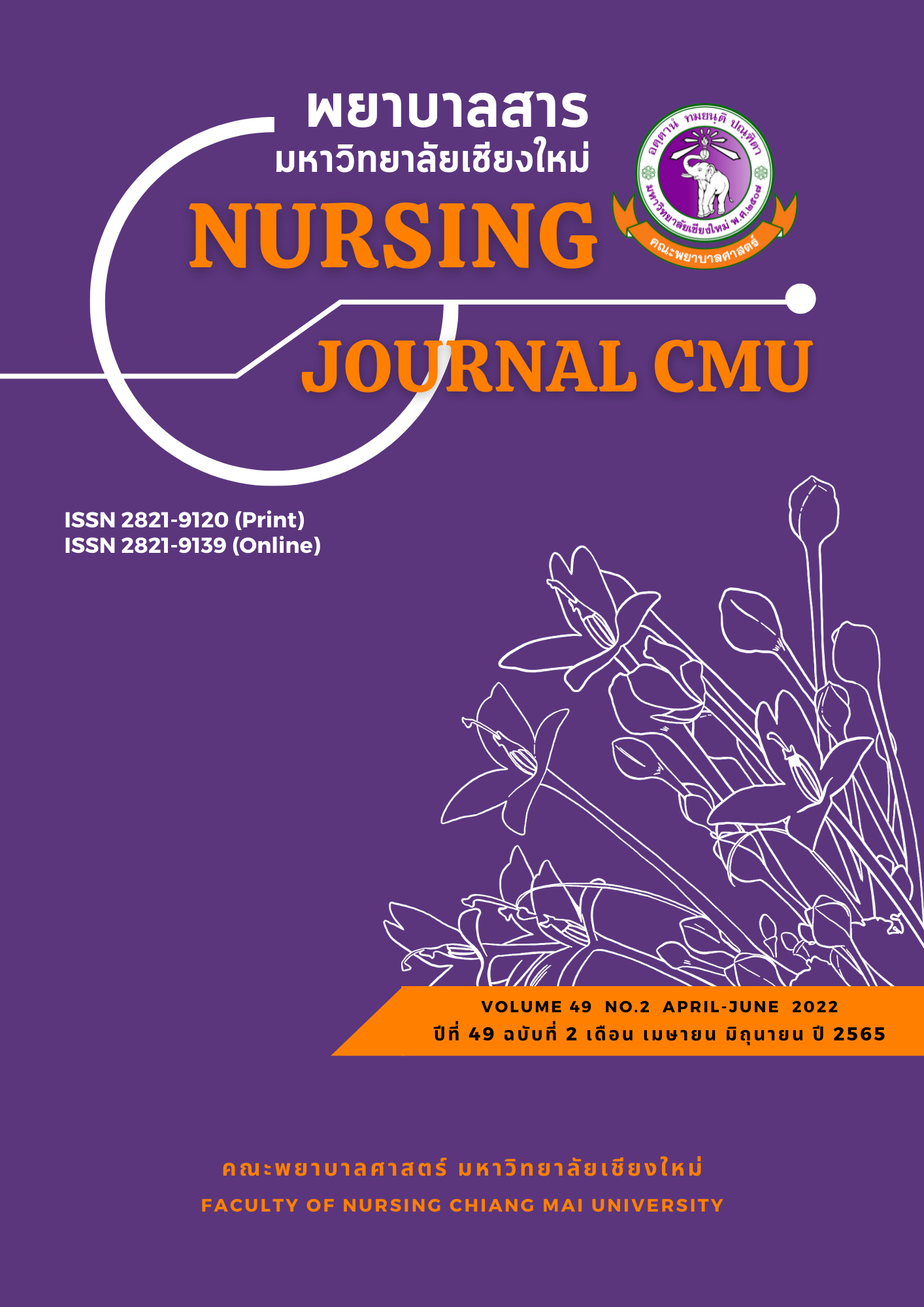ผลของโปรแกรมการเรียนรู้แบบมีส่วนร่วมต่อความรู้ในการควบคุม การบริโภคยาสูบของนักศึกษาพยาบาล
คำสำคัญ:
การควบคุมการบริโภคยาสูบ, โปรแกรมการเรียนรู้แบบมีส่วนร่วม, นักศึกษาพยาบาลบทคัดย่อ
การวิจัยนี้เป็นการวิจัยกึ่งทดลอง ระยะเวลาที่ศึกษา 2 สัปดาห์ มีวัตถุประสงค์เพื่อศึกษาผลของโปรแกรมการเรียนรู้แบบมีส่วนร่วมต่อความรู้ในการควบคุมการบริโภคยาสูบของนักศึกษาพยาบาล กลุ่มตัวอย่าง คือ นักศึกษาพยาบาล ชั้นปีที่ 2 แบ่งเป็นกลุ่มทดลองและกลุ่มควบคุม กลุ่มละ 23 คน โดยกลุ่มทดลอง คือ กลุ่มที่ได้รับโปรแกรมการเรียนรู้แบบมีส่วนร่วม และกลุ่มควบคุม คือ กลุ่มที่ไม่ได้รับโปรแกรม ด้วยวิธีสุ่มแบบจับคู่ เครื่องมือที่ใช้ในการวิจัย ประกอบด้วย โปรแกรมการเรียนรู้แบบมีส่วนร่วม แบบสอบถามข้อมูลส่วนบุคคล และแบบวัดความรู้เกี่ยวกับการควบคุมการบริโภคยาสูบ ซึ่งผ่านการตรวจสอบความตรงตามเนื้อหาจากผู้ทรงคุณวุฒิ จำนวน 3 ท่าน และได้ค่าความเชื่อมั่นเท่ากับ 0.70 วิเคราะห์ข้อมูลโดยใช้สถิติเชิงพรรณนา และใช้สถิติเชิงอนุมาน ได้แก่ สถิติทดสอบวิลคอกซัน และ สถิติทดสอบแมนวิทนีย์ยู
ผลการวิจัยพบว่า กลุ่มทดลองมีค่ามัธยฐานคะแนนความรู้ในการควบคุมการบริโภคยาสูบ หลังการทดลองสูงกว่ากลุ่มควบคุมอย่างมีนัยสำคัญทางสถิติ (P<0.001) และกลุ่มทดลองมีค่ามัธยฐานคะแนนความรู้ในการควบคุมการบริโภคยาสูบ หลังการทดลองสูงกว่าก่อนการทดลองอย่างมีนัยสำคัญทางสถิติ (P=0.001)
โปรแกรมการเรียนรู้แบบมีส่วนร่วม สามารถเพิ่มความรู้เกี่ยวกับการควบคุมการบริโภคยาสูบของนักศึกษาพยาบาลได้ นอกจากนั้น นำไปใช้เป็นแนวทางในการพัฒนานักศึกษาพยาบาลให้เกิดองค์ความรู้เกี่ยวกับการควบคุมการบริโภคยาสูบได้ เพื่อนำความรู้ที่ได้ไปให้ความรู้เกี่ยวการควบคุมการบริโภคยาสูบตามบทบาทวิชาชีพพยาบาลได้ต่อไป
เอกสารอ้างอิง
Bundhamcharoen, K., Aungkulanon, S., Makka, N., & Shibuya, K. (2016). Economic burden from smoking-related diseases in Thailand. Tobacco Control, 25(5), 532–537.
Burns, N., & Grove. S., K. (2009). The practice of nursing research: Appraisal, synthesis and generation of evidence (6th ed.). St. Louis, MO: Elsevier Saunders.
Chomsri, P., Aramratana, A., Siviroj, P., & Kuntawee, S. (2017). Prevalence of substance used and association between substances used with sensation seeking among vocational Students. Nursing Journal, 44(2), 172-181. (in Thai)
Chaiyalab, S., Vongareesawat, C., & Riyaphan, S. (2018). Professional experience promoting activities for enhancing knowledge, attitude and practice skills against harmfulness of tobacco among nursing students. Thai Journal of Nursing, 67(1), 33-39. (in Thai)
Ekezie, W., Murray, R. L., Agrawal, S., Bogdanovica, I., Britton, J., & Leonardi-Bee, J. (2020). Quality of smoking cessation advice in guidelines of tobacco-related diseases: An updated systematic review. Clinical Medicine, 20(6), 551.
Kolb, A. Y. and Kolb, D. A. (2008). Experiential learning theory: A dynamic, holistic approach to management learning, education, and development. Armstrong: Management Learning, Edu. and Develop.
Kaewsutha, N., Visalseth, W., Apiwat, S., & Thakolwiboon, D. (2014). The smoking situations of primary school children and the dental professional role. Srinakharinwirot University Dental Journal, 7(2), 103-120. (in Thai)
Makmai, W., Preechawong, S., & Treenai, S. (2019). Effect of promoting smoking cessation program for parents to reduce secondhand smoke exposure in pediatric patients with asthma. Nursing Journal, 46(2), 59-69. (in Thai)
Meehanpong, P., & Chatdokmaiprai, K. (2018). Assessing quality of research instrument in nursing research. Journal of the Royal Thai Army Nurse, 19(1), 9-15. (in Thai)
National statistical office, Ministry of Digital Economy and Society. (2017). The smoking and drinking behavior survey 2017. Bangkok: Pimdeekarnpim. (in Thai)
Punpom, D. (2018). Effects of participatory learning on behavior changing for smoking cessation among high school students in Chiang Mai Province (Master’s thesis). Chiang Mai Rajabhat University, Thailand. Retrieved from http://www.cmruir. cmru.ac.th/bitstream/123456789/1864/2/%E0%B9%80%E0%B8%94%E0%B8%B7%E0%B8%AD%E0%B8%99%E0%B8%89%E0%B8%B2%E0%B8%A2Fulltext.pdf. (in Thai)
Pinitdee, P., & Sota, C. (2015). The application of life skills to smoking prevention in junior secondary school students, Srithat District, Udonthani Province. Journal of the Office of DPC 6 Khon Kaen, 22(2). 11-20. (in Thai)
Polit, D.F., & Hungler, B.P. (1983). Nursing research: Principles and methods. Philadelphia: Lippincott.
Suttirut, S., Phunpanich, T., & Leamsuwan, I. (2019). Participation learning management for development of immunology learning outcomes and 21st century skills. Huachiew Chalermprakiet University Journal, 23(2), 267-278. (in Thai)
Sanadiasi, S., Vathesatogkokit, K., &Suwanratsamee, S. (2020). Integration success on tobacco consumption control in Bachelor of Nursing program. Bangkok: Publishing of suetawan. (in Thai)
Tobacco Product Control Act. (2017). Tobacco product control act B.E. 2560. Retrieved from http://www.ratchakitcha.soc.go.th/DATA/PDF/2560/A/039/27.PDF (in Thai)
World Health Organization. (2004). Code of practice on tobacco control for health professional organizations. Geneva: World Health Organization.
World Health Organization. (2015). WHO global report on trends in prevalence of tobacco smoking. Geneva: World Health Organization.
World Health Organization. (2019). WHO global report on trends in prevalence of tobacco use 2000-2025 (3 rd ed.). Geneva: World Health Organization.
ดาวน์โหลด
เผยแพร่แล้ว
รูปแบบการอ้างอิง
ฉบับ
ประเภทบทความ
สัญญาอนุญาต
ลิขสิทธิ์ (c) 2022 พยาบาลสาร

อนุญาตภายใต้เงื่อนไข Creative Commons Attribution-NonCommercial-NoDerivatives 4.0 International License.
บทความที่ได้รับการตีพิมพ์เป็นลิขสิทธิ์ของวารสารพยาบาลสาร
ข้อความที่ปรากฏในบทความแต่ละเรื่องในวารสารวิชาการเล่มนี้เป็นความคิดเห็นส่วนตัวของผู้เขียนแต่ละท่านไม่เกี่ยวข้องกับมหาวิทยาลัยเชียงใหม่ และคณาจารย์ท่านอื่นๆในมหาวิทยาลัยฯ แต่อย่างใด ความรับผิดชอบองค์ประกอบทั้งหมดของบทความแต่ละเรื่องเป็นของผู้เขียนแต่ละท่าน หากมีความผิดพลาดใด ๆ ผู้เขียนแต่ละท่านจะรับผิดชอบบทความของตนเองแต่ผู้เดียว






